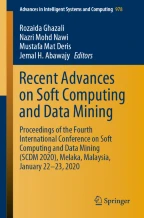Abstract
Digital Reference Service (DRS) play a vital role in the Digital Library (DL) research. DRS is a very valuable service provided by DL. Unfortunately, the reference service movement towards digital environment begins late, and this shift was not model based. So, a journey towards a digital environment without following a proper model raises some issues. A few researchers presented a general process model (GPM) in the late 1990s, but this process model could not overcome the problems of DRS. This paper proposes an enhanced model for DRS that use the storage and re-use mechanism with other vital components like DRS search engine and ready reference for solving the issues in DRS. Initially, storage and re-use mechanism are designed and finally, DRS search engine is designed to search appropriate answers in the knowledge base. We improved the GPM by incorporating the new components. The simulation results clearly states that the proposed model increased the service efficiency by reducing the response time from days to seconds for repeated questions and decreased the workload of librarians.
Access this chapter
Tax calculation will be finalised at checkout
Purchases are for personal use only
Similar content being viewed by others
References
Ramos MS, Abrigo CM (2012) Reference 2.0 in action: an evaluation of the digital reference services in selected Philippine academic libraries. Libr Hi Tech News 29(1):8–20
Noiret S (2018) Digital public history. In: A companion to public history, p 111
Malik A, Mahmood K (2013) Infrastructure needed for digital reference service (DRS) in university libraries: an exploratory survey in the Punjab, Pakistan. Libr Rev 62(6/7):420–428
Wasik JM (1999) Building and maintaining digital reference services. ERIC Digest
Lankes RD (1998) Building and maintaining internet information services: K-12 digital reference services. ERIC
Lankes RD (2004) The roles of digital reference in a digital library environment. In: Proceedings of the international conference of digital library-advance the efficiency of knowledge utilization, Beijing, China, pp 6–8
Lankes RD (2004) The digital reference research agenda. J Am Soc Inf Sci Technol 55(4):301–311
Lankes RD (2004) Digital reference. Encycl Libr Inf Sci 1(1):1–3
Liu J (2008) Digital library and digital reference service: integration and mutual complementarity. Policy Futur Educ 6(1):59–76
Booth C (2008) Video reference and the library kiosk: experimentation and evaluation. J Access Serv 5(1–2):47–53
Bakeri Abu Bakar A (2012) Myths and realities of digital reference services: perspectives of libraries from developing countries. Libr Manag 33(3):136–141
Huang L, Zhou F (2010) Study on teacher-librarian collaborative distance education model. In: 2010 International conference on intelligent computing and cognitive informatics, pp 138–140
Peters T (2018) Online students’ use of virtual reference services. J Electron Resour. Librariansh 30(1):1–8
Smith LC, Wong MA (2016) Reference and information services: an introduction. ABC-CLIO
Arndt TS (2010) Reference service without the desk. Ref Serv Rev 38(1):71–80
Collard S, Whatley K (2011) Virtual reference/query log pairs: a window onto user need. Ref Serv Rev 39(1):151–166
White MD (2001) Digital reference services: framework for analysis and evaluation. Libr Inf Sci Res 23(3):211–231
Dee C, Allen M (2006) A survey of the usability of digital reference services on academic health science library web sites. J Acad Librariansh 32(1):69–78
Desai CM (2003) Instant messaging reference: how does it compare? Electron Libr 21(1):21–30
Cloughley K (2004) Digital reference services: how do the library-based services compare with the expert services? Libr Rev 53(1):17–23
McCrea R (2004) Evaluation of two library-based and one expert reference service on the Web. Libr Rev 53(1):11–16
Kani-Zabihi E, Ghinea G, Chen SY (2006) Digital libraries: what do users want? Online Inf Rev 30(4):395–412
Vakkari P (2011) Comparing Google to a digital reference service for answering factual and topical requests by keyword and question queries. Online Inf Rev 35(6):928–941
David AT (2001) What is the best model of reference service. Libr Trends 50(2):P183–197
Bertot JC, Real B, Jaeger PT (2016) Public libraries building digital inclusive communities: data and findings from the 2013 digital inclusion survey. Libr Q 86(3):270–289
Pomerantz J (2004) Question taxonomies for digital reference. SIGIR Forum 38(1):79
Jacsó P (2006) Open access ready reference suites. Online Inf Rev 30(6):737–743
Cassell KA, Hiremath U (2019) Reference and information services: an introduction. American Library Association
Stemper JA, Butler JT (2001) Developing a model to provide digital reference services. Ref Serv Rev 29(3):172–189
Weiss A (2016) Examining massive digital libraries (MDLs) and their impact on reference services. Ref Libr 57(4):286–306
Buckland MK (2007) The digital difference in reference collections. J Libr Adm 46(2):87–100
Layer RM, Pedersen BS, DiSera T, Marth GT, Gertz J, Quinlan AR (2018) GIGGLE: a search engine for large-scale integrated genome analysis. Nat Methods 15(2):123
Loesch MF (2017) Librarian as professor: a dynamic new role model. Educ Libr 33(1):31–37
Sindhgatta R, Marvaniya S, Dhamecha TI, Sengupta B (2017) Inferring frequently asked questions from student question answering forums. In: EDM
Agosti M, Ferro N, Silvello G (2018) Digital libraries: from digital resources to challenges in scientific data sharing and re-use. In: A comprehensive guide through the Italian database research over the last 25 years, pp 27–41. Springer, Cham
Internet public library. http://www.ipl.org/. Accessed 02 Jan 2015
Acknowledgments
The authors would like to thank Universiti Tun Hussein Onn Malaysia (UTHM) and Ministry of Higher Education (MOHE) Malaysia for financially supporting this Research under IGSP grants note U420 and under Trans-displinary Research Grant Scheme (TRGS) vote no. T003.
Author information
Authors and Affiliations
Corresponding authors
Editor information
Editors and Affiliations
Rights and permissions
Copyright information
© 2020 Springer Nature Switzerland AG
About this paper
Cite this paper
Shahzad, A., Nawi, N.M., Mahdin, H., Khan, S.N., Hamid, N.A. (2020). An Enhanced Model for Digital Reference Services. In: Ghazali, R., Nawi, N., Deris, M., Abawajy, J. (eds) Recent Advances on Soft Computing and Data Mining. SCDM 2020. Advances in Intelligent Systems and Computing, vol 978. Springer, Cham. https://doi.org/10.1007/978-3-030-36056-6_1
Download citation
DOI: https://doi.org/10.1007/978-3-030-36056-6_1
Published:
Publisher Name: Springer, Cham
Print ISBN: 978-3-030-36055-9
Online ISBN: 978-3-030-36056-6
eBook Packages: Intelligent Technologies and RoboticsIntelligent Technologies and Robotics (R0)
